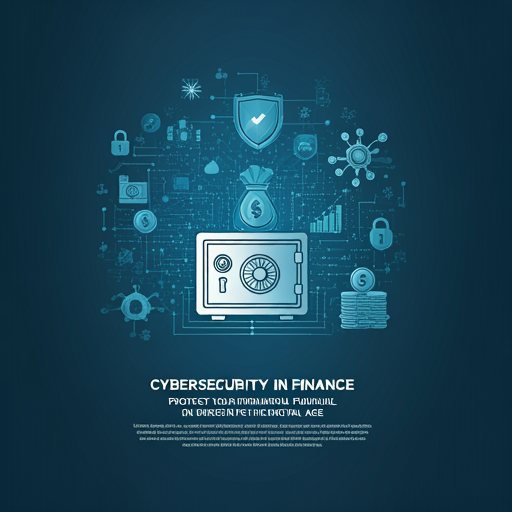Introduction to Cybersecurity in Finance
The Importance of Cybersecurity
In the financial sector, cybersecurity is crucial for protecting sensitive data and assets. With increasing digital transactions, the risk of cyber threats has escalated. Financial institutions must implement robust security measures to safeguard client information. This is essential for maintaining trust and integrity in the market. Cybersecurity breaches can lead to significant financial losses. It’s alarming how quickly these incidents can escalate. Therefore, investing in advanced security protocols is not just prudent; it’s necessary. Protecting assets is a priority for every investor.
Overview of Financial Cyber Threats
Financial cyber threats are diverse and evolving rapidly. These threats include phishing, ransomware, and data breaches. Each typewrite poses unique risks to institutions and individuals alike. It’s concerning how often these attacks occur. For instance, phishing scams trick users into revealing sensitive information. This can lead to severe financial repercussions. Ransomware can lock users out of their systems, demanding payment for access. Such incidents highlight the need for vigilance. Awareness is key to prevention.
Understanding Cryptocurrency Security
How Cryptocurrencies Work
Cryptocurrencies operate on decentralized networks using blockchain technology. This technology ensures transparency and security in transactions. Each transaction is recorded in a public ledger, making it difficult to alter. This feature enhances trust among users. Additionally, cryptographic techniques protect user identities and transaction details. He must understand these mechanisms to navigatw the market effectively. Security measures are vital for safeguarding assets. Awareness of potential vulnerabilities is crucial .
Common Vulnerabilities in Cryptocurrency
Cryptocurrencies face several common vulnerabilities that can jeopardize user assets. For instance, inadequate security measures can lead to unauthorized access. This often results in significant financial losses. Additionally, software bugs can create exploitable weaknesses in the system. He should be aware of these risks. Phishing attacks also target unsuspecting users, tricking them into revealing sensitive information. Awareness is essential for protection. Regular audits can help identify potential threats.
Types of Cyber Threats in Finance
Phishing Attacks
Phishing attacks are deceptive tactics used to steal sensitive information. These attacks often involve fraudulent emails or websites that mimic legitimate sources. He must recognize these threats to protect his assets. Victims may unknowingly provide personal data, leading to financial loss. Awareness is crucial in preventing such incidents. Always verify the source before clicking links. Trust your instincts; they matter.
Ransomware and Malware
Ransomware and malware are significant threats in the financial sector. Ransomware encrypts data, demanding payment for access. This can paralyze operations and lead to substantial losses. Malware, on the other hand, can steal tender information without detection. He should implement robust security measures to mitigate these risks. Regular backups are essentiql for recovery. Prevention is always better than cure.
Best Practices for Safeguarding Assets
Using Strong Passwords and Two-Factor Authentication
Using strong passwords and two-factor authentication is essential for securing financial assets. A strong password typically includes a mix of letters, numbers, and symbols. He should avoid easily guessable information. Two-factor authentication adds an extra layer of security by requiring a second verification method. This significantly reduces the risk of unauthorized access. Regularly updating passwords is also advisable. Simple steps can enhance security.
Regular Software Updates and Security Patches
Regular software updates and security patches are critical for maintaining system integrity. These updates often address vulnerabilities that cybercriminals exploit. He must prioritize timely installations to protect his assets. Neglecting updates can lead to significant security risks. Automated updates can simplify this process. Staying informed about the latest threats is also essential. Knowledge is power in cybersecurity.
Secure Storage Solutions for Cryptocurrency
Hot Wallets vs. Cold Wallets
Hot wallets are connected to the internet, allowing for quick access to funds. This convenience comes with increased security risks. Cold wallets, however, are offline storage solutions that provide enhanced security. He should consider using cold wallets for long-term storage. Each option has its advantages and disadvantages. Understanding these differences is crucial for asset protection. Security should always be a priority.
Hardware Wallets and Their Benefits
Here are 10 trending article titles for a financial website based on the latest news and analysis: No input data
Regulatory Framework and Compliance
Understanding Financial Regulations
Understanding financial regulations is essential for compliance in the cryptocurrency sector. These regulations aim to protect investors and ensure market integrity. He must stay informed about evolving laws and guidelines. Non-compliance can result in severe penalties and reputational damage. Regulatory frameworks vary by jurisdiction, impacting operational strategies. Awareness of these differences is crucial for businesses. Knowledge is power in navigating regulations.
Compliance Best Practices for Cryptocurrency Businesses
Compliance best practices for cryptocurrency businesses include implementing robust KYC and AML procedures. These measures help prevent fraud and money laundering. He should regularly train staff on compliance requirements. Documentation is essential for audits and regulatory reviews. Staying updated on regulatory changes is crucial. Knowledge is key to avoiding penalties. Regular assessments can identify compliance gaps.
The Future of Cybersecurity in Finance
Emerging Technologies and Their Impact
Emerging technologies significantly influence cybersecurity in finance. Innovations like artificial intelligence enhance threat detection capabilities. He must adapt to these advancements quickly. Blockchain technology also offers improved transaction security. This can reduce fraud risks effectively. Regular updates are essential for staying secure. Knowledge of these technologies is vital. Understanding their implications is crucial for success.
Preparing for Future Cyber Threats
Preparing for future cyber threats requires proactive strategies and continuous education. Financial institutions must invest in advanced security technologies. This includes machine learning for real-time threat analysis. He should conduct regular risk assessments to identify vulnerabilities. Staying informed about emerging threats is essential. Collaboration with industry experts can enhance defenses.

Leave a Reply